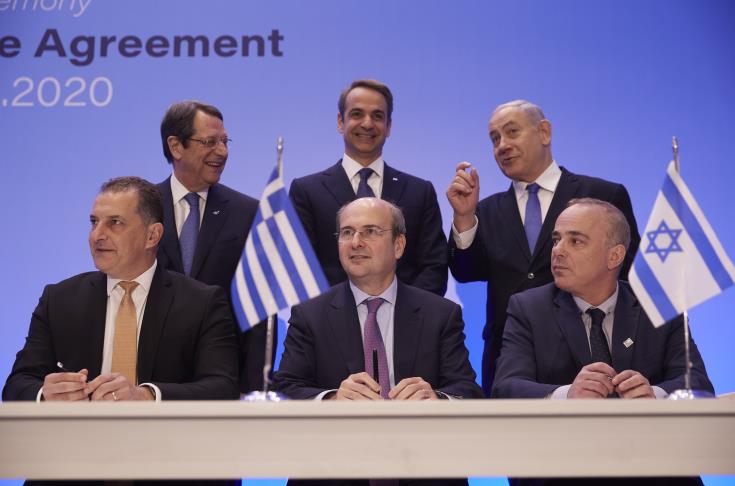The Cyprus government has approved the ratification framework for the €7 bln EastMed natural gas pipeline agreed in January with Greece and Israel that is now headed to parliament for final ratification.
Energy Minister George Lakkotrypis said Thursday that the Cabinet approved the agreement signed in Athens on January 2 with a provision allowing Italy to join the 1,900km project at a later stage.
The multilateral agreement determines various issues between the participating countries, including maritime procedures, matters of security, the environment, and the establishment of a joint working group to observe progress.
He said the EastMed project has already secured €35 mln in EU funding for four studies that are ready to be tendered.
The first is for the marine survey and the other three for the front-end engineering design (FEED) for the onshore facilities, including pipelines, converter stations, as well as a FEED technical survey for the subsea route.
Lakkotrypis said the coronavirus pandemic did not cause any delays to the project.
“Don’t forget that planning for such a large-scale project is not dependent on current developments, but look at three, four, five years ahead,” the minister said.
“Very soon, the joint venture will proceed to find buyers for the eastern Mediterranean natural gas which, at the end, is the most important criterion that will determine how viable the project is.”
As regards Italian participation in the pipeline, Lakkotrypis said, “there is no recent development, as you realise that countries like Italy have been focused on dealing with the pandemic. I’m sure that in the immediate future the subject [of Italian participation] will reopen.”
The EastMed is expected to carry 9 to 12 billion cubic metres of natural gas a year from offshore reserves held by Israel and Cyprus to Greece, and then on to Italy and other southeastern European countries.
The deal for the undersea pipeline to carry gas from new offshore deposits in the southeastern Mediterranean to mainland Europe was ratified by a Greek parliamentary committee on May 11, where Greek Energy Minister Kostis Hatzidakis said it constitutes a game-changer for Athens and Europe.
He said the EastMed project will strengthen Greece’s strategic relationship with Cyprus and Israel while giving a concrete answer to Turkey’s “revisionism and provocativeness” in the region.
Answering to criticism by opposition parties over Italy’s absence from the intergovernmental agreement, Hatzidakis said Rome participated in the whole negotiation process and retains its right to sign the agreement in good time.
“We consider that this issue will have a positive development, but we are leaving open all the options as regards the final routing of the pipeline, without ruling out the possibility of other countries to participate, such as Egypt,” Hatzidakis said.
He said the economic viability of the project largely depends on what gas quantities Israel and Cyprus earmark from existing and potential natural gas fields.
Challenging market
Energy analyst Charles Ellinas, a Senior Fellow at the Global Energy Center of the Atlantic Council recently wrote in the Financial Mirror that there is a huge oversupply of oil and gas – as a result of low demand due to the economic impact of Covid-19 – and prices are extremely low.
And this will continue into the longer-term, for at least the next 2-3 years.
With new liquefied natural gas (LNG) projects under construction having received FIDs (final-investment-decisions) during the last two years, something like 186mtpa (million tonnes/annum) new LNG may come into the market by 2027.
As demand is expected to increase by 100-150mtpa by 2030, oversupply and low prices should continue over this period, Ellinas wrote, adding that spot LNG prices in Europe, Asia and the US have now converged to around $2/mmbtu (about 1000 cubic feet).
“Even though these are expected to rise post-COVID-19, looming oversupply means that prices will not reach levels that would make East Med gas commercially viable. It is under this challenging backdrop the future of East Med hydrocarbons must be viewed.”
“Moreover, with global gas prices as low as $2/mmbtu, Egypt is unable to sell its LNG even at the low asking price of $5/mmbtu and has shut-in Idku.
“It is also in the unenviable situation of being locked into importing Israeli gas at over $6/mmbtu while curtailing production of its own cheaper gas from the Zohr gas-field.
It is no surprise that import of Aphrodite gas to Idku is stalled and, with gas prices remaining low into the 2020s, the future of such a deal is at risk.”
Ellinas said that the alternative option of exporting East Med and Cyprus gas to Europe through the EastMed gas pipeline, now back in the news, is equally challenged for the same reasons as before.
“Even though the required gas supplies are available, it still needs to secure gas sales contracts in Europe.
With gas demand in Europe expected to be declining as we approach 2030, due to the impact of the ‘EU Green Deal’, and prices staying low, competition from plentiful and much cheaper gas makes such a project highly challenging.”










